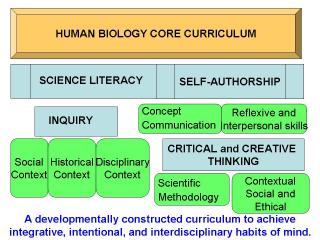|
|
Human Biology Major In
response to the increasing social and ethical complexity of current
scientific problems and the strong support of life science research in
the state of Indiana, an interdisciplinary core of faculty at Indiana
University Bloomington constructed the Human Biology Bachelor of Science and Bachelor of Arts Degrees. The development process
of the student competencies, classroom pedagogies, and core curriculum
involved campus-wide conversations, and intensive program development
by Faculty Fellows during Summer Institutes. Ongoing reflection,
assessment, and sharing about faculty instruction and student learning
inform the progress of the program. This Human Biology curriculum
is uniquely designed around a core sequence of four interdisciplinary
three-credit courses, occurring from the freshman through senior years,
each paired with a one-credit seminar course. Students also complete
foundational disciplinary courses (12 cr. BA, 18 cr. BS) as well as a
selection of courses from one of four areas of concentration (12 cr.
BA, 27 cr. BS). Currently, the four Areas of Concentration are: Human
Health and Disease; Human Reproduction and Sexuality; Human Environment
and Ecology; Human Origins and Survival. Emphasizing
key pedagogies of case study analysis, team-based learning, and
original research, the Human Biology Program purposefully and
developmentally enhances students' frameworks for incorporating facts
and concepts, but also fosters life-long learning competencies in
rigorous and intensive scientific inquiry, interdisciplinary thinking,
critical analysis, interpersonal communication, and self-reflection.
Human Biology students are guided through increasingly advanced levels
of critical thinking throughout the program to develop the ways of
knowing needed to: i) explore complex scientific problems, ii)
integrate their scientific knowledge with societal concerns, iii)
provide and advocate for ethical and multi-dimensional solutions, and
iv) address complex problems they will face in the future in the life
science industry or in continued graduate or professional studies.
Students may pursue careers in medicine, other health professions,
public policy, law, journalism, research, or teaching.
|
|

Core Curriculum of the Human Biology Major
|
|
|
|
|
Area Certificate in Human Biology The Area Certificate in Human Biology is an interdisciplinary certificate program
within the College of Arts and Sciences that is partnered with the
Indiana University School of Medicine. The Area Certificate in Human
Biology is a 28-29 credit hour program that provides an integrated
educational opportunity not available through individual departments on
the Bloomington campus. The objectives of the Area Certificate in Human
Biology are: i) to provide a broad and rigorous introduction to the
biological sciences, ii) to relate these sciences to the ethical
problems raised by the relationships of human beings to one another and
to their environment, and iii) to provide students with the opportunity
to draw connections within their academic learning to their lives
outside of academia. The Certificate will also provide an opportunity for each student to develop a reflective electronic portfolio (e-portfolio). A
reflective e-portfolio is a creative method for students to showcase
their academic growth, illustrate unique personal and extracurricular
activities and to make meaningful connections between these
experiences. In the Certificate's capstone course (BIOL L-390), students will use the Carnegie Foundation for the Advancement of Teaching and Learning's KEEP Toolkit
to document their academic coursework and extra-curricular activities,
examine and reflect on the knowledge they have gained, relate their
work to their future studies or careers, and present their work
electronically to specified audiences. Many
students who are seeking admission into Allied Health and other
professional degree programs graduate from Indiana University with a
General Studies Degree. The Area Certificate in Human Biology offers an
opportunity for students to distinguish themselves from others seeking
similar employment and academic admission. Student electronic
portfolios constructed using the KEEP Toolkit will allow Indiana
University students to present themselves in unique, informative, and
exciting ways to potential employers, graduate and professional degree
programs, and communities of learning within the Human Biology Program
and university.
|
|
|
|
Scholarship of Teaching and Learning for the Human Biology Program The
Human Biology Program at Indiana University Bloomington applies the
principles of the scholarship of teaching and learning throughout our
program. Faculty,
students, and program facilitators document, assess, and share their
progress toward the program's goals of developing students who can
understand the historical and cultural complexity of the life sciences
and who can advocate for well-reasoned and supported solutions to
intricate scientific problems. Our work in the Human Biology Program is made public through: Archiving the work of faculty, students, and program administrators in the Carnegie Foundation's KEEP ToolkitCampus presentationsNational and international conference posters and presentations
|
|
|